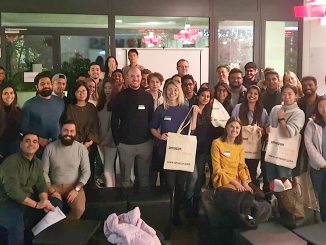
For many people, job interviews stir up feelings of fear, anxiety and pressure. That’s hardly surprising: these conversations have a lot riding on them. They might determine your first job, a move into a new industry, or a leap in your career. However, as is often the case in life, preparation is half the battle. In truth, there are a number of typical questions that crop up time and again in job interviews – which allows you to prepare for them effectively. In this blog article, we’ll not only look at the 30 most common interview questions. Our experts at Munich Business School (MBS) have also provided useful tips for successful answers to these 30 interview questions. Equipped with these tips, there will be nothing to prevent your next job interview being a roaring success!
Expertise for your next job interview The MBS expert team discussing good answers in job interviews draws from theory and practice. From academic research, the active process of recruitment and daily contact with companies, they know what makes them tick and what answers to interview questions recruiters want to hear.
Interview Questions To Open the Conversation
1. Tell us a little about yourself!
Prof. Dr. Sophie Hieke, Academic Director of the master’s program in International Marketing and Brand Management, has the following advice: “Keep it short and sweet! Recruiters don’t want to hear a summary of your entire career – they’ve already read that in your application. Instead, it’s better to select individual experiences from the different stages in your career to date (training, studies, internships, jobs) and pick out skills you have developed, so that you can explore them in more detail.”
“Even if this question is obviously meant from a professional perspective, you can also throw in success stories from your hobbies and free time, such as sports or voluntary work – especially if such anecdotes demonstrate characteristics and abilities that would be relevant to your new job. You should always have relevance to the job in mind when selecting the points you want to convey,” adds Prof. Dr. Heiko Seif, Academic Director of the master’s program in Sports Business and Communication
2. Why should we choose you? / What sets you apart from other applicants?
This question has an obviously answer – it’s because you’re the best person for the job. But how can you formulate this in a reasonable way without being so direct? Prof. Dr. Sophie Hieke and Prof. Dr. Heiko Seif have a suggestion: “Above all, recruiters are interested in the added value you can offer the company, not the other way round. Make it clear that you are familiar with the tasks and duties you would be assigned and explain how your skills and experience would enable you to contribute to the company’s development. Avoid long monologues outlining the new things you want to learn in the post, as this highlights the benefit to the applicant, not the company.”
Interview Questions Regarding Your Motivation
3. Why would you like to work for us as [xyz]?
Prof. Dr. Heiko Seif recommends: “Explain what you feel makes the role attractive and what prompted you to apply for it. It might be the topic area, the freedom and flexibility to create something, the working environment, the company’s mission, or even a recommendation from someone you know. Whatever aspect you choose to focus on, you need to have this answer ready and be able to express it clearly. You won’t make a good impression if you have to think long and hard about the reasons you want the job during the interview!”
4. Why are you looking to change roles? / Why do you want to leave your current employer?
Prof. Dr. Sophie Hieke has a golden rule to follow here: “Never speak poorly of your past or current employers, managers or colleagues! This also applies when you’re looking for a new job. No employer wants to recruit somebody they’re worried will talk negatively about them in their next interview. Instead, focus on how you hope to develop in the future and why your new employer would be a better option in light of this.”
5. What motivates you to get out of bed in the morning?
“This is one of my absolute favorite job interview questions. I recommend you spend time thinking about this one ahead of time. It’s all about your personal WHY – why you do the things you do. Every company is looking for employees who strive for more than simply corporate success and who work for the company out of an inner conviction. With this in mind, your answer should always be associated with positive feelings. Not sure about what your WHY is? Go out and find it! Find your WHY, a book by Simon Sinek, is a good place to start,” says Felix Ewald, Head of Marketing & Sales.
6. What are your salary expectations?
Christine Menges, Chancellor and CFO of Munich Business School, has some insights: “This is a decisive question, especially for young professionals, as future salary increases are usually calculated as a percentage of your current salary. Questions about salaries can crop up at different points in the application process – in the original application form, during your first telephone conversation with the recruiter, or in an interview with someone from the department. However, you can be sure that the question will come eventually. This makes it all the more important to prepare well for this question. Use online benchmarking portals to research standard salaries in the industry for your level of qualification and professional experience. If you are able to realistically estimate your desired salary and express this confidently, you will demonstrate to your prospective employer that you know your market value and are self-assured. In any case, negotiation is a skill you can learn, such as in our Negotiation Skills seminar.”
7. What do you know about our company? Why exactly do you want to work for us?
Kristina Hiltmair, HR manager at Munich Business School has the following tip: “Preparing is also important for this question. It immediately becomes clear whether an applicant has at least looked at the company’s homepage. If you aren’t able to discuss the company right away as the interviewer wishes, you should at least try to show interest. Give some information about the company and then ask a few specific questions about certain aspects. When it comes to the question of what interests you most about a company, I would recommend naming a few points that put the company itself in the foreground, such as its mission, the working environment it provides, its market position, and so on.”
8. How well do you know our market? Are you aware of our competitors, customers and the market leader?
“In addition to the obligatory research into the company itself, the next step is gathering information about the environment in which it operates. Make sure you set aside enough time for this ahead of the interview. A solid answer can really impress: it shows that you have engaged in detail with the company, the industry and key stakeholders, and are genuinely interested in the position,” says MBS Career Center Manager Stephanie Stangl.
9. How did you come across the job advertisement?
HR manager Kristina Hiltmair advises: “In addition to naming the website or portal where you found the vacancy, feel free to outline the process you used to look for jobs and the key criteria you applied. The path to a job interview is often not completely direct, so this information is very interesting and helpful for those of us in HR.”
10. Are you interviewing for any other positions?
Stephanie Stangl, business expert and Manager of the MBS Career Center, recommends approaching this question as follows: “I would put my cards on the table. It’s normal to have more than one interview lined up. Recruiters often ask this question, and with good reason: they want to know where you are in your job search and how quickly you need a response. At the same time, you don’t want to leave the impression that you’ve applied to hundreds of companies and don’t care about where your offer actually comes from.”
11. What is important to you in an employer?
Stephanie Stangl recommends: “Be honest in your answer and respond logically, in line with your previous answers. Talk about your personal values – which, ideally, should correspond to the company’s values. You can usually find a company’s stated values on their website. On this point, as is so often the case, researching ahead of the interview can prove worthwhile.”
Interview Questions Regarding Your Personality and Work Style
12. What are your strengths and weaknesses?
Kristina Hiltmair, HR Manager at MBS, shares this insight: “Don’t underestimate this question. There are certain evergreen questions in job interviews where, unfortunately, far too many people slip up. Good preparation is the name of the game. When it comes to your strengths, it can be helpful to have a list of your strong qualities to hand, ideally characteristics that have been confirmed by others. You might choose three things from this list in your job interview – qualities that are best suited to the advertised position. Don’t forget that you should always be able to back up the strengths you name with specific examples from your career to date! Contrary to common perceptions, naming weaknesses in a job interview is not a bad thing. However, it is important to consider them carefully and ensure you word this answer amiably. Make sure that the weaknesses you state do not conflict with the position you’re interviewing for and show that you’re actively working to improve your weaknesses. For strengths and weaknesses alike, it’s important that you always answer this question in a professional context!”
13. What does success mean to you?
Stefan Baldi, Dean of Munich Business School, says: “This question is ultimately about what motivates you, especially in a professional environment. Your counterpart in the interview wants to understand how the applicant’s personal ideas and perceptions would line up with those of the company. Think about your personal values and try to find and express a common denominator with the company’s culture. Make absolutely certain that the success you describe appears plausible, achievable and understandable – this is actually more important than your exact answer! As a follow-up question, recruiters like to ask about specific examples from your professional experience or, for young professionals, examples from your studies or private life.” (see Question 20)
14. Are you a team player or a lone warrior?
Christine Menges, Chancellor at MBS, recommends: “It’s best to be diplomatic when answering this question. Consider whether the role requires more of a team player or a lone warrior. Most cases call for characteristics of both aspects to differing degrees in differing situations. You need to be able to work in a team so that you can cooperate effectively with colleagues and contribute to the company’s success. However, there are also tasks that require you to work independently and organize yourself. Make clear that you can do both. Think of a specific situation that demonstrates each skill – instance in which you demonstrated your ability to work in a team and achieve success independently. By doing so, you will show the recruiter or department representative that you have a reflective approach and are aware of the advantages of both abilities.”
15. What role do you take in groups?
Stephanie Stangl, Manager of the MBS Career Centers, has the following tip: “First of all, I would recommend being authentic. Reflect on the roles you have taken on in different group projects. Are you a team player who makes sure that the team structure works effectively? Or are you more of a creative mind, an innovator who generates new ideas? It’s also important to bear in mind the role for which you’ve applied. If it’s a managerial position, you should focus on instances where you have taken responsibility in past roles, such as serving as a project manager. By contrast, if you’re applying for an internship, you should focus on other aspects instead. In any case, your answer should be based on specific examples from your professional experience or day-to-day studies.”
16. In your résumé, you wrote that you enjoy reading. What was the last book you read? [also applicable to other interests]
HR expert Kristina Hiltmair says: “Choose carefully when listing interests in your résumé. They need to be truthful and you should be able to provide vibrant answers if asked. The person interviewing you will have asked this question because they want to find out more about your personality or perhaps because they have the same hobby.”
17. How do you handle stress?
Felix Ewald, Head of Marketing & Sales at MBS, explains: “Recruiters ask this question to find out how applicants deal with time pressure and peaks in workload. When pressure rises, nerves can become frayed and the atmosphere in a team can become tense. Describe to the people interviewing you how you maintain a sense of inner balance (e.g. through exercise) and create a counterpoint to your stressful working day. At the same time, your answer should explore how you actively reduce stress in the workplace by through effective organization and prioritization, such as using a Kanban board or other useful tools and methods.”
18. What do you do to help you grow/improve?
Prof. Dr. Stefan Baldi, Dean of MBS, advises: “Companies want to recruit employees for the long term. Even if you currently meet the requirements of the position you’ve applied for, these requirements could change in future. Failing to have an answer ready for this question therefore leaves a poor impression. The person interviewing you wants to know how you approach new challenges. Are you ambitious and driven? Are you interested in learning new things? Take the time in advance to consider two specific examples of times in the past you faced challenges and overcame them. As ever, it’s vital that your answer remains honest and authentic.”
Interview Questions Regarding Your Work Experience and Skills
19. What have your duties been to date?
Felix Ewald, Head of Marketing and Sales as MBS, has this recommendation: “Talk about three to five duties that are listed in the job profile. Start with the most important one. You should paint the recruiter a clear picture of how you have mastered these duties in the past. If the interview is with a recruiter as well as someone from the relevant specialist department, you can go into more detail and dazzle them with your expertise. But don’t overdo it! Make sure not to monologue; instead, be aware of the other people in the conversation: give them the opportunity to ask questions about what you say and start a discussion.”
20. Are there any situations/projects/achievements in your career of which you are particularly proud? Why?
Prof. Dr. Patricia Kraft, Academic Director of the bachelor’s program in International Business at MBS has this advice: “Don’t pass up this opportunity to make a good impression in your job interview. Think of two or three good projects ahead of time – ideally projects that you can directly link to the profile of the job you want. This allows your potential new employer to see the skills you already have in this field. It’s important to explain this as clearly, concisely and incisively as possible. The STAR (Situation, Task, Action, Result) method can work well here. Outline the initial situation, describe the precise task, explain the steps you took in successfully managing the problem, and – crucially – the results you achieved, complete with specific, measurable outcomes.”
21. What parts of your studies/education have you enjoyed most/least and why?
Once again, Prof. Dr. Patricia Kraft recommends being honest: “Try not to simply outline topics and content from your studies that you feel your prospective employer wants to hear based on the job profile. Instead, describe your favorite topics, or the topics you found challenging, in each case providing coherent reasoning. In addition to subject-specific aspects, this might include the lecturer’s teaching style, the lectures themselves, discussions in seminars or case studies you have discussed.”
22. What relevant IT-related skills do you have? (i.e. software, programs)
Here’s a tip from business expert Stephanie Stangl: “This is a good opportunity to talk about certificates you’ve earned.* You can also refer to programs you’ve used in the course of your work. Above all, make sure the mention programs that are listed in the job description or could be relevant to the advertised position. Try to describe your knowledge as objectively as possible.”
* This also applies to a question about language skills.
23. Do you have a role model? Is there anyone who has had a particular impact on your career to date?
Kristina Hiltmair, HR Manager at MBS, explains: “People give very different answers to this question. They might name their parents or other family members, careers advisors, former colleagues or managers. You should describe how and why this person shaped you by underlining specific qualities or characteristics, or pointing to a turning point in your career. This helps recruiters to understand you better as an individual and gain an insight into your mindset.”
Interview Questions Regarding Your Career Plans
24. Where do you see your career going?
Prof. Dr. Heiko Seif has some sage advice: “There are two decisive steps in this answer. First, talk about your next, short-term career goals; second, outline the steps you intend to take as part of your long-term development. Explain how you plan to achieve these goals and make it clear that the job you’ve applied for is the perfect path to this. Take care not to go into too much detail as far as the future is concerned. Ultimately, you don’t want to give the impression that you might want to leave the company in the near future.”
25. Where do you see yourself in ten years?
Here’s a tip from Kristina Hiltmair from the MBS HR department: “Answering this question requires a degree of tact. Consider why the recruiter has asked you this question. Are they trying to assess your ambition or your loyalty? However you interpret the question, your answer should not give the impression that you’re only using this job as a stepping stone to reach another position or another company.”
Surprise, Stress and Brainteaser Interview Questions
26. Is there anything you did not include in your résumé you feel we should know about you?
Kristina Hiltmair, HR Manager at MBS, has a clear recommendation: “Make sure you have a good answer to this question ready! This is another opportunity to make an impression and catch your interviewer’s attention. Remember that it is often the simplest things – things that may seem banal or trivial to you – that your interviewer might find fascinating or interesting.”
27. [If there are gaps in your career history:] Why weren’t you working during this period?
Kristina Hiltmair has a tip for answering this interview question: “Prepare carefully for this question so that you don’t seem surprised. In my experience, being honest about this has the most lasting impact. Always bear in mind that taking time for yourself to develop and find your own path is a sign of strength, not weakness.”
28. Could you complete this exercise for us? (Exercise is read out/displayed, e.g. How many golf balls would fit in a school bus?)
HR Manager Kristina Hiltmair recommends for this type of interview questions: “When it comes to this type of brainteaser questions, it’s worth taking your time reading through and reflecting on the question. Let the interviewer into your thought process because, in many cases, it’s not finding the right solution that matters (if there even is one!) but rather how you handle the question, approach the task and find a logical justification for your answer.
Illegal Interview Questions
29. What is your family situation and what are your family plans for the immediate future?
MBS Career Center Manager Stephanie Stangl says: “Recruiters are not permitted to ask this question in Germany. You do not have to answer it. In fact, the recruiter might even have asked you this question to see how much you know about German labor law – especially if you’re interviewing for a job in human resources. Stay calm and self-assured. For example, you might ask why this information is relevant to the position, or point out that asking this question is not permitted. Depending on how the company reacts and how you feel, you would be entirely justified in decided against the company based on this.
Here are a few other taboo interview questions:
- What is your faith/religion?
- Where do you come from?
- How old are you?
- What is your sexual orientation?
- Do you have any debts?
- Have you ever spent time in prison?
- Are you often ill?
- Are you a member of a political party?
- etc.
To Conclude: Your Own Questions
30. Do you have any other questions?
HR expert Kristina Hiltmair has a tip for answering this question: “Congratulations! You made it to the end of the interview. But don’t start heading for the door just yet. You always need to have at least one question ready to ask at this point! The opportunity to pose a question of your own is both a test and an opportunity. You can demonstrate your interest in the job, find out more about your prospective employer and clear up anything you’re uncertain about. Positive examples of questions you can ask in an interview include questions about professional development opportunities, the company’s areas of specialization, or topics from the interview to which you’d like to circle back. However, you should avoid direct questions about salary increases, promotions and similar topics.”

You are interested in economics and want to acquire in-depth business know-how?
Then the international business degrees at Munich Business School (MBS) are just right for you! At MBS you won’t cram dry theory from old textbooks, but learn in a outcome-oriented way and gain valuable practical experience. Convince yourself:
Bachelor’s in International Business
Master’s in International Business
Master’s in International Business I Finance
Master’s in Innovation and Entrepreneurship
Master’s in International Marketing and Brand Management
Master’s in Sports Business and Communication
MBA General Management
Doctor of Business Administration



